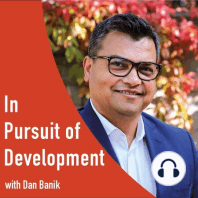86 min listen

Nigeria and the inadequacies of the resource curse thesis – Zainab Usman
Nigeria and the inadequacies of the resource curse thesis – Zainab Usman
ratings:
Length:
63 minutes
Released:
Apr 21, 2021
Format:
Podcast episode
Description
There is considerable academic literature on the resource curse thesis which aims to explain why resource-rich countries have not benefited from their oil and mineral resources. And this resource curse thesis within economics, political science, and sociology has numerous economic, political, social, and environmental dimensions.But in her work, our guest has often highlighted the inadequacies of the “resource curse” thesis particularly in explaining dissatisfaction with the pace of economic development in her own country – Nigeria.Zainab Usman is a senior fellow and Director of the Africa Program at the Carnegie Endowment for International Peace. She has previously worked as a Public Sector Specialist at the World Bank and is co-author of the book, The Future of Work in Africa: Harnessing the Potential of Digital Technologies for All. She also contributed to World Bank’s flagship report – Rethinking Power Sector Reforms in Developing Countries. Her forthcoming book, Economic Diversification in Nigeria: The Politics of Building a Post-Oil Economy, is set to be published later this year.Zainab Usman on TwitterDan Banik and In Pursuit of Development on Twitter
Released:
Apr 21, 2021
Format:
Podcast episode
Titles in the series (100)
The relevance of foreign aid — Bård Vegar Solhjell: Dan Banik speaks with Bård Vegar Solhjell on the moral, economic, and political foundations of aid and whether it is still relevant in today’s world. by In Pursuit of Development